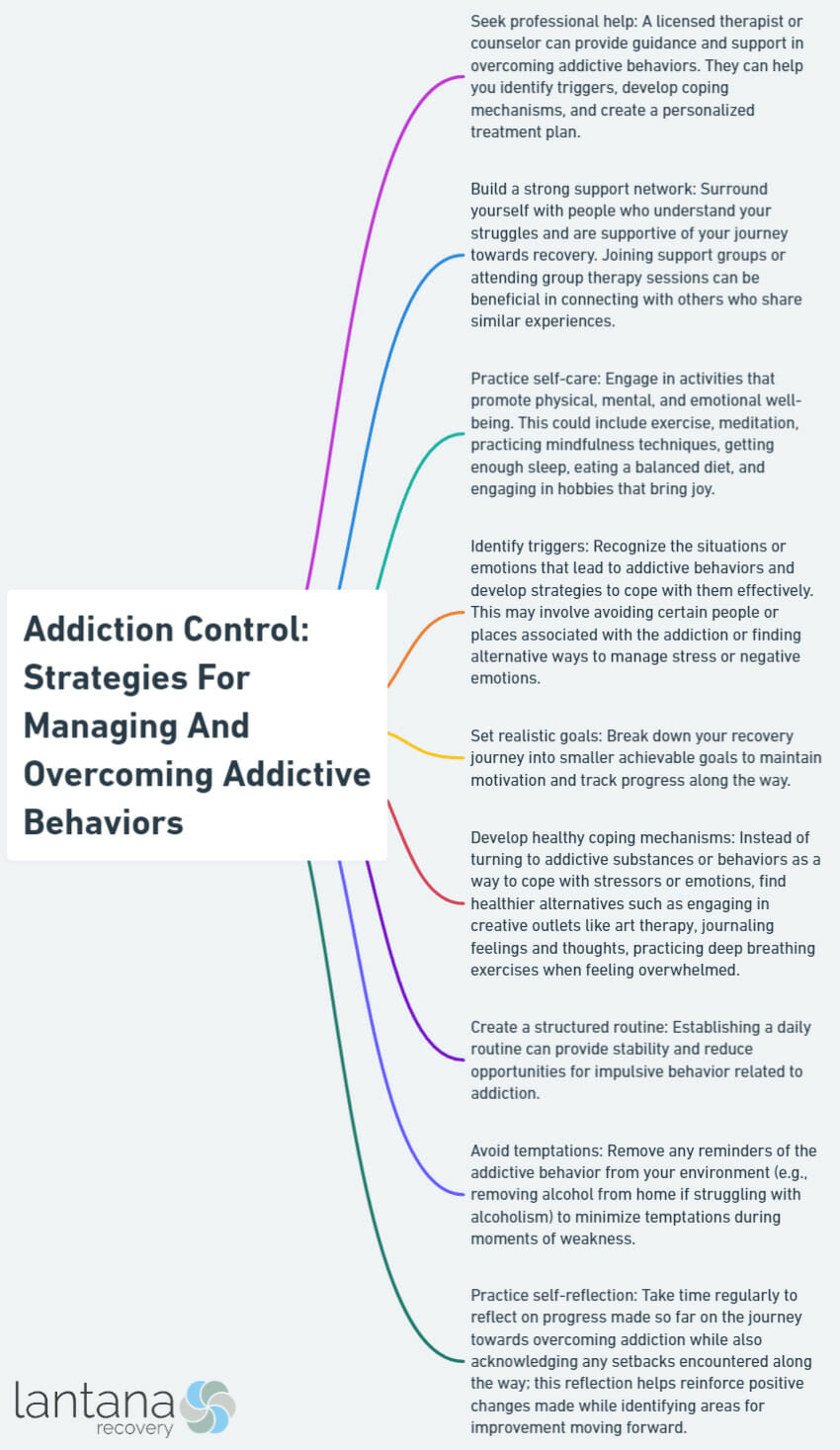Addiction is a complex and challenging issue that affects individuals from all walks of life. It is crucial to understand addiction and the various strategies available to manage and overcome addictive behaviors. By exploring this topic, we can gain insights and knowledge to support those struggling with addiction on their journey to recovery.
By understanding addiction, implementing effective strategies, and seeking appropriate treatment options, individuals can take control of their lives and overcome addictive behaviors. Prevention efforts can also contribute to creating a healthier society, where individuals are equipped with the resources to make positive choices and lead fulfilling lives.

Understanding Addiction
Addiction is a brain disease that causes compulsive behavior. It leads to uncontrollable urges to engage in activities or consume substances, despite negative consequences. Several factors contribute to addiction, including genetics, environment, and psychology. These factors interact and increase the risk of developing an addiction.
One common type of addiction is drug addiction. It involves repeated use of substances like opioids, cocaine, and methamphetamines, leading to physical and psychological dependence. Another type is a behavioral addiction, which includes compulsive behaviors like gambling, excessive gaming, or shopping, providing pleasure and reward.
To understand addiction, it’s important to recognize it as a treatable condition. Effective treatment combines therapy, medication, and support groups. Seek help from experienced healthcare professionals in addiction treatment.
Supporting individuals facing addiction involves cultivating empathy and providing a safe, non-judgmental environment. Offering support and understanding enhances motivation for change and helps overcome addictive behaviors. Professional guidance and a comprehensive treatment approach are necessary for addressing this complex issue.
What Is Addiction?
Addiction, also known as a chronic brain disorder, is characterized by compulsive engagement in rewarding stimuli despite negative consequences. It affects multiple areas of the brain, including the reward, motivation, and memory circuits.
Addiction can manifest in various forms, such as substance addiction, gambling addiction, internet addiction, and food addiction. These addictive behaviors can significantly impair personal, social, and professional life. For instance, King et al., defined internet addiction in their study Cognitive-Behavioral Approaches to Outpatient Treatment of Internet Addiction in Children and Adolescents as an impulse control disorder, sharing similarities with pathological gambling in 2012.
Seeking professional help is paramount in dealing with addiction. Addiction specialists, therapists, and counselors like those at Lantana Recovery can provide guidance, support, and evidence-based treatments to address underlying issues contributing to addiction. Building a strong support network is also crucial, as it provides individuals with encouragement, understanding, and accountability.
To manage addiction, individuals need to develop healthy coping mechanisms. These can include engaging in activities like exercise, hobbies, and mindfulness practices. Setting realistic goals and recognizing triggers are important steps in the recovery process. By addressing underlying issues such as trauma or mental health disorders, individuals can enhance their chances of overcoming addictive behaviors.
Therapy and counseling are essential treatment options for addiction. Through individual therapy, group therapy, or family therapy, individuals can gain insights into their addictive behaviors, learn coping strategies, and cultivate healthier habits. Medication-assisted treatment may also be recommended in some cases, especially for substance addiction. Support groups, such as 12-step programs, can provide a sense of community and understanding.
Preventing addiction involves increasing awareness of the risks and consequences associated with certain behaviors or substances. Early intervention and education play a significant role in prevention. Promoting healthy coping mechanisms, such as stress management and emotional regulation, can also help prevent the development of addictive behaviors.
By understanding addiction, seeking support, and implementing effective strategies, individuals can successfully manage and overcome addictive behaviors.
Suggestions:
- Consider attending therapy or counseling sessions to gain insights into addictive behaviors and develop healthier coping mechanisms.
- Join a support group to connect with individuals who have experienced similar struggles and gain valuable support.
- Educate yourself about the risks and consequences associated with addictive behaviors to make informed choices. Some educational resources can include addiction DVDs used to understand and overcome addiction.
- Practice mindfulness and engage in activities that promote relaxation and stress reduction.
Common Types of Addictive Behaviors
- Gambling addiction: Involves a compulsion to gamble despite negative consequences. Can lead to financial ruin, relationship problems, and other detrimental effects on the individual’s life.
- Substance abuse: Refers to the misuse or dependence on substances such as drugs or alcohol. Can have severe physical, psychological, and social consequences and often requires professional treatment to overcome.
- Internet and technology addiction: Individuals can become addicted to activities like excessive social media use, online gaming, or constantly checking emails. These behaviors can interfere with daily life and result in social isolation and decreased productivity.
- Eating disorders: Conditions such as binge eating disorder, anorexia nervosa, and bulimia nervosa involve addictive behaviors related to food and body image. Individuals may have an unhealthy obsession with food, extreme dieting or purging behaviors, and a distorted perception of their bodies.
- Compulsive shopping: Involves a constant urge to shop and spend money. This can lead to financial difficulties and accumulating unnecessary possessions. Individuals may experience temporary satisfaction but struggle with impulse control and the need to make more purchases.
- Work addiction: Some individuals develop an addiction to work, neglecting other areas of their life such as relationships and self-care. This behavior can lead to burnout, poor mental health, and strained interpersonal relationships.

Strategies for Managing Addiction
When it comes to managing addiction, there are a variety of strategies that can be highly effective. In this section, we’ll uncover powerful methods that can help individuals overcome addictive behaviors. From seeking professional help to building a strong support network, developing coping mechanisms, and engaging in healthy activities, we’ll explore these approaches to provide you with the tools you need for managing and conquering addiction. Together, we’ll navigate the path toward a healthier and more fulfilling life.
Seeking Professional Help
Seeking professional help is crucial when it comes to overcoming addictive behaviors. Here are a few key reasons why it is so important:
1. Expert guidance: Therapists and counselors have specialized knowledge and training in addiction treatment. They can offer evidence-based strategies and techniques that are tailored to your specific needs.
2. Individualized treatment: Professional help allows for personalized treatment plans that are designed specifically for your unique circumstances. Professionals can assess your situation, identify underlying issues, and develop a comprehensive approach to assist you in overcoming addiction.
3. Emotional support: Dealing with addiction can be overwhelming and emotionally challenging. Professionals provide a safe and supportive environment where you can openly discuss your thoughts and feelings. This can help you gain insight and learn healthy coping mechanisms like self-regulation which Baumeister & Wonasch explored in a 2015 research paper titled Uses of self-regulation to facilitate and restrain addictive behavior. Self-regulation plays a vital role in overcoming the initial aversion to drugs and alcohol and in sustaining addictive usage patterns despite various situational obstacles, such as illegal status, erratic availability, and family disapproval.
4. Accountability: Professionals can hold you accountable for your recovery journey. They can monitor your progress, provide encouragement, and help you stay motivated to achieve your goals.
5. Access to resources: Seeking professional help gives you access to a network of resources and support groups. They can connect you with additional services and programs that can enhance your recovery process.
Pro-tip: When searching for professional help, it is important to find a provider who specializes in addiction treatment and with whom you feel comfortable and supported. During the initial consultation, make sure to ask questions and discuss your needs and preferences.
Building a Support Network
Building a support network is crucial for managing and overcoming addiction. It provides the necessary support, encouragement, and accountability for positive change. Here are key strategies for building a strong support network:
-
Reach out to understanding and non-judgmental family and friends. They can provide emotional support and a listening ear.
-
Join addiction-specific support groups or therapy sessions. These provide a safe space to share experiences, receive guidance, and learn from others.
-
Connect with mentors or role models who have overcome addiction. Their guidance can inspire and motivate you on your recovery journey.
-
Utilize online communities and forums dedicated to addiction recovery. They offer diverse perspectives and resources from individuals worldwide.
-
Consider seeking help from addiction recovery specialists. They provide personalized guidance tailored to your needs.
Remember, building a support network takes time and effort. Surround yourself with positive influences who genuinely care about your well-being. Nurturing these relationships can strengthen your resolve, provide valuable insights, and increase your chances of successfully managing addiction.
Developing Coping Mechanisms
Developing Coping Mechanisms is crucial for managing and overcoming addictive behaviors. Here are strategies that can help individuals develop effective coping mechanisms:
1. Identify triggers: Recognize specific situations, emotions, or thoughts that lead to addictive behaviors. By identifying triggers, individuals can understand addiction and develop coping strategies.
2. Practice relaxation techniques: Engage in relaxation techniques such as deep breathing, meditation, or mindfulness to reduce stress and cravings. These techniques promote calmness and help manage emotions.
3. Build a support network: Surround yourself with supportive and understanding individuals to develop coping mechanisms. Friends, family, or support groups provide encouragement, accountability, and guidance.
4. Find healthy alternative activities: Engage in activities that bring fulfillment and joy to replace addictive behaviors. This could include hobbies, exercise, or creative outlets. These activities distract from cravings and enhance overall well-being.
5. Seek professional help: Consult a therapist or counselor specialized in addiction for valuable guidance and support. They provide personalized strategies and techniques based on individual needs.
Remember, developing coping mechanisms takes time and effort. Be patient and persistent in implementing these strategies. With practice and support, individuals can successfully manage and overcome addictive behaviors.
Pro-tip: Setbacks are part of the recovery process. If a coping mechanism doesn’t work as expected, don’t give up. Adjust and try different strategies until you find what works best for you.
Engaging in Healthy Activities
Engaging in healthy activities is crucial for managing and overcoming addictive behaviors. By incorporating positive activities, such as exercise, pursuing healthy hobbies, practicing mindfulness, joining support groups, spending time in nature, and exploring new interests, you can enhance your well-being and develop proficiency in avoiding triggers and relapse.
Here are some suggestions for engaging in healthy activities:
1. Exercise regularly: Engage in at least 30 minutes of moderate-intensity exercise, such as brisk walking, jogging, or cycling, each day. This will not only boost your physical health but also contribute to your mental well-being.
2. Pursue healthy hobbies: Find activities that bring you joy and serve as positive outlets for your energy. Painting, playing a musical instrument, gardening, or cooking nutritious meals are some examples of healthy hobbies that can provide fulfillment.
3. Practice mindfulness: Incorporate mindfulness activities like meditation, deep breathing exercises, or yoga into your routine. These practices can help reduce stress, increase self-awareness, and promote relaxation.
4. Join support groups: Connect with others who have similar experiences to gain support and understanding. Consider joining support groups or attending recovery meetings to share your journey and receive guidance from individuals who can relate.
5. Spend time in nature: Immerse yourself in nature by going for a hike, walking on the beach, or simply sitting in a park. Being in nature has a positive impact on mood and brings a sense of peace.
6. Explore new interests: Discover new hobbies, interests, or educational pursuits that align with your passions and personal goals. This exploration will create a sense of purpose and fulfillment outside of addictive behaviors.
Remember, engaging in healthy activities does not guarantee overcoming addiction, but they serve as powerful tools to support your recovery journey. By making positive choices and nurturing a healthy lifestyle, you can build a strong foundation for long-term sobriety and well-being.

Overcoming Addictive Behaviors
Discover the powerful strategies for overcoming addictive behaviors in this section. From setting realistic goals to recognizing triggers and avoiding relapse, addressing underlying issues, and celebrating milestones and successes, we’ll explore the practical steps towards reclaiming control over your addiction. Let’s dive into these effective methods backed by research and expert insights, empowering you on your journey towards a healthier, addiction-free life.
Setting Realistic Goals
Setting realistic goals is vital in successfully managing and overcoming addictive behaviors. It serves as a roadmap for progress, helping individuals stay focused and motivated. Here are some key points to consider when setting realistic goals:
- Clearly define specific objectives: In your recovery journey, clearly define what you aim to achieve. Whether it’s reducing substance use, breaking habits, or improving mental health, be specific about your goals.
- Break it down into smaller steps: To prevent feeling overwhelmed and easily track your progress, divide your overall goal into smaller, manageable steps.
- Make your goals specific and measurable: Set goals that are both specific and measurable. For example, aim to reduce substance use by a certain percentage or attend a specific number of therapy sessions per month.
- Consider a realistic timeline: Set a timeline that allows for gradual progress and avoids disappointment. Be realistic about the time it will take to achieve your goals.
- Regularly review and adjust: Continuously assess your goals and make any necessary adjustments. As you make progress, you may find the need to modify existing goals or set new ones.
- Celebrate milestones: Acknowledge and celebrate each milestone you reach along your recovery journey. This celebration will boost your motivation and reinforce positive behavior.
- Seek support from your network: Involve your support network, such as friends, family, or support groups, in the goal-setting process. They can offer guidance, hold you accountable, and provide encouragement.
By setting realistic goals, you establish a solid foundation for a successful recovery journey. Remember to be patient with yourself and celebrate each step forward.
Recognizing Triggers and Avoiding Relapse
Recognizing triggers and avoiding relapse is crucial in managing addictive behaviors. It is important to understand the situations, people, or emotions that lead to cravings or the desire to engage in addictive behaviors. By identifying these triggers, you can develop a detailed plan for how you will respond when faced with them. This plan may involve using coping strategies, reaching out to a support network, or distracting yourself with healthy activities.
Additionally, it is helpful to eliminate objects or environments associated with addictive behaviors to reduce the chances of relapse. Taking care of yourself is also essential. Prioritize activities that enhance your overall well-being, such as exercise, proper nutrition, and stress-reducing techniques. Surrounding yourself with a strong support network that understands your journey and can provide guidance and encouragement is also beneficial.
If managing triggers and avoiding relapse becomes challenging, seek professional help from a therapist, counselor, or addiction specialist. Remember, managing addiction is a journey, and relapse may occur. Use it as an opportunity to learn and adjust your plan. With perseverance and the right strategies, you can overcome addictive behaviors and live a healthier, more fulfilling life.
Addressing Underlying Issues
Addressing underlying issues is crucial in overcoming addictive behaviors. By examining and acknowledging the root causes of addiction, individuals can gain a better understanding of the factors that contribute to their addictive behaviors and actively work towards resolving them.
One vital step in this process is identifying unresolved trauma or emotional pain that may act as a catalyst for the addiction. This can be achieved through seeking therapy or counseling to delve into past experiences and develop effective coping mechanisms.
Additionally, it is important to address any co-occurring mental health disorders that may be present alongside the addiction. Many individuals who struggle with addiction also battle mental health issues such as anxiety, depression, or trauma-related disorders. It is crucial to seek appropriate treatment for these conditions, as doing so can greatly aid in managing addictive behaviors.
Building a strong support network is another key component of overcoming addiction. Surrounding oneself with supportive and understanding individuals creates a sense of belonging and facilitates the process of overcoming challenges associated with addiction. Support groups, such as Alcoholics Anonymous or Narcotics Anonymous, can provide valuable insights and guidance during this journey.
Lastly, it is essential for individuals to explore and adopt healthy coping mechanisms to replace addictive behaviors. Engaging in activities such as exercise, mindfulness practices, or hobbies can effectively manage stress and emotions in a healthier and more productive manner.
Celebrating Milestones and Successes
Celebrating milestones and successes is crucial in the journey of overcoming addiction and staying committed to recovery. It serves as a reminder of the progress we have made and inspires us to continue making positive changes. There are several ways to commemorate milestones and achievements:
1. Setting milestones: It is beneficial to break down the recovery journey into smaller milestones, such as achieving one week or one month of sobriety. Recognizing each part of the the addiction tree or addictive patterns and celebrating each milestone attained is important.
2. Reflecting on achievements: Taking the time to reflect on the positive changes and challenges conquered boosts confidence and strengthens our dedication to recovery.
3. Rewarding yourself: Treating yourself to something that brings joy and promotes well-being, like a day at the spa, a day trip, or indulging in a favorite hobby or activity, can be a great way to celebrate.
4. Sharing with others: Celebrating milestones and successes with loved ones, friends, or a support group creates a sense of community and support. Sharing accomplishments boosts morale and encourages others on their recovery journey.
5. Marking the occasion: Creating a physical reminder of the milestone or success, such as a journal entry, a certificate, or a commemorative item, serves as a tangible reminder of the progress made.
6. Giving back: Utilize the celebration as an opportunity to support others on a similar recovery journey. Share your story, offer support, or volunteer at a local organization to give back and inspire others.
By celebrating milestones and successes, we acknowledge the hard work and dedication put into overcoming addiction. It is a constant reminder of our progress and keeps us motivated on the path to recovery.

The Role of Treatment Options
When it comes to managing and overcoming addictive behaviors, understanding the role of treatment options is crucial. In this section, we’ll take a closer look at the different avenues available for individuals seeking help. From therapy and counseling to medication-assisted treatment and support groups, we’ll explore these options and their significance in the journey toward addiction control. So, whether you’re curious about the benefits of therapy sessions or the role of support groups, get ready to dive into the realm of effective treatments for addiction.
Therapy and Counseling
Therapy and counseling from experts in drug rehab such as Lantana Recovery are crucial in managing and overcoming addictive behaviors. Here are important points to consider:
1. Therapy and counseling offer a safe and supportive space to explore the underlying causes of addiction.
2. Professional therapists and counselors use evidence-based techniques to help individuals develop effective coping mechanisms for triggers and cravings.
3. Through therapy and counseling, individuals can better understand their addictive behaviors and learn healthier ways to manage stress and emotions.
4. Therapy sessions can be individual or group-based, based on the individual’s needs and preferences.
5. Counseling sessions address not only addiction but also underlying mental health issues like anxiety or depression.
6. Therapists and counselors collaborate with individuals to set realistic recovery goals and provide continuous support and guidance.
7. The duration of therapy and counseling varies depending on progress and needs, with some benefiting from short-term interventions and others requiring longer-term support.
By actively engaging in therapy and counseling, individuals can gain the necessary tools and insights to overcome addictive behaviors and lead healthier, fulfilling lives.
Medication-assisted Treatment
Medication-assisted treatment, also known as MAT, is a highly effective approach to managing and overcoming addictive behaviors. This comprehensive treatment combines the use of specific medications along with counseling and therapy to provide individuals with the support they need to recover from addiction.
A crucial component of medication-assisted treatment is the use of medications. These medications, such as methadone, buprenorphine, and naltrexone for opioid addiction, and disulfiram or acamprosate for alcohol addiction, are carefully selected to reduce cravings, minimize withdrawal symptoms, and restore balance in the brain.
In addition to medication, counseling, and therapy are essential in medication-assisted treatment. These therapeutic techniques help individuals address the root causes of their addiction, develop coping mechanisms, and learn healthier strategies for managing cravings and triggers.
Another important aspect of medication-assisted treatment is its focus on preventing relapse. Ongoing support and monitoring, including regular check-ins with healthcare providers, ensure that the medication is effective and can be adjusted if necessary. Support groups and peer networks also play a significant role in maintaining sobriety.
One of the strengths of medication-assisted treatment is its individualized approach. Healthcare providers work closely with patients to determine the most appropriate medication and dosage based on their specific addiction and medical history.
Research consistently shows that medication-assisted treatment significantly improves treatment outcomes for individuals with addiction. It reduces the risk of relapse, decreases overdose deaths, and ultimately enhances the overall quality of life.
It is important to note that medication-assisted treatment should always be administered under the guidance of a healthcare professional experienced in addiction medicine. It is just one important component of a comprehensive treatment plan that may also include counseling, therapy, and lifestyle changes.
Support Groups
Support groups are crucial for managing and overcoming addictive behaviors. They provide a supportive environment where individuals can share experiences, receive guidance, and find encouragement from people who can relate to their struggles. Here are some key benefits of support groups:
1. Emotional support: Support groups offer a safe space for expressing emotions and receiving empathy from others who have been through similar experiences. This validation reduces isolation.
2. Shared experiences: By connecting with others who have faced similar challenges, support groups help individuals gain insights, learn coping strategies, and develop a sense of belonging. Success stories from these groups inspire hope and motivation.
3. Accountability: Support groups provide a sense of accountability as members share goals and progress. This helps individuals stay committed and motivated to make positive changes in their lives.
4. Learning from others: In support groups, individuals have the opportunity to learn from the experiences and wisdom of others. Members openly share strategies, resources, and tips for managing cravings, triggers, and setbacks. This collective knowledge aids in developing effective coping mechanisms.
5. Building a support network: Support groups facilitate the formation of meaningful connections and friendships with like-minded individuals. These relationships provide ongoing support and guidance, especially during challenging times.
Participating in a support group is a voluntary choice, but it can positively impact an individual’s recovery journey. It’s important to find a support group that suits specific needs and preferences, whether through in-person meetings or online communities.

Preventing Addiction
Preventing addiction requires a proactive approach that focuses on increasing awareness, providing education, and implementing early intervention strategies. By understanding the importance of promoting healthy coping mechanisms, we can effectively tackle addictive behaviors. Let’s delve into each sub-section to uncover the impactful strategies that contribute to addiction prevention.
Increasing Awareness
Increasing awareness is crucial in preventing addiction and promoting healthier behaviors. By raising awareness, individuals and communities can understand the risks associated with addictive behaviors and take proactive steps to prevent and address them.
Here are some strategies to consider for increasing awareness:
- Implement educational campaigns: Provide accurate information about addiction, its consequences, and available resources to dispel myths and misconceptions.
- Engage with local communities: Conduct workshops, seminars, and support groups to create a supportive environment that encourages dialogue and knowledge-sharing around addiction prevention.
- Collaborate with schools and universities: Develop age-appropriate curricula and programs to ensure comprehensive education on addiction and its risks for young people.
- Organize awareness events: Host events such as awareness walks, fundraisers, and panel discussions to draw attention to addiction-related issues and encourage public participation in prevention efforts.
- Leverage media campaigns: Use television, radio, and social media to amplify the message of addiction prevention and provide resources for those seeking help.
Increasing awareness minimizes the stigma associated with addiction, promotes open conversations, and empowers individuals to make informed decisions for their own well-being and the well-being of others.
True history: One example of increasing awareness is the “Just Say No” campaign in the 1980s, led by First Lady Nancy Reagan. This campaign aimed to educate children about the dangers of drug use and encourage them to reject peer pressure. Through celebrity endorsements and school programs, the campaign reached millions of young people, highlighting the importance of making healthy choices and resisting substance abuse. Although criticized for its simplistic approach, the campaign successfully raised awareness about the risks of addiction and initiated conversations about prevention strategies.
Education and Early Intervention
Education and early intervention are crucial in preventing and addressing addiction. Incorporating these keywords, here are some strategies to consider:
- Increase Awareness: Educate individuals about addiction risks and consequences through comprehensive education programs at schools, community centers, and workplaces. By providing relevant information, we can help raise awareness about the harmful effects of addiction and its prevention.
- Promote Healthy Coping Mechanisms: Teach individuals healthy ways to cope with stress, emotions, and challenges without resorting to addictive substances or behaviors. Encouraging activities such as exercise, mindfulness, hobbies, and creative outlets can positively contribute to one’s overall well-being. For instance, “enhancing self-efficacy through training coping skills, especially abstinence-focused coping skills to react properly in high-risk situations can be useful” (Relapse Coping Strategies in Young Adults Addicts: A Qualitative Study in Iran, Shafiei et al., 2016.)
- Provide Early Intervention: Aim to identify and intervene in addictive behaviors as early as possible through effective screening programs, counseling services, and outreach initiatives. Timely intervention can help prevent the progression of addiction and provide individuals with the necessary support they need.
-
Offer Support and Counseling: Make accessible counseling services available to individuals who are at risk of or struggling with addiction. These services may include individual therapy, group counseling, or support groups that aim to address underlying issues contributing to addiction.
-
Engage Families: Involve families in the education and intervention process to create a holistic support system. Provide resources and support that enable families to understand addiction, recognize warning signs, and learn how to appropriately provide assistance to their loved ones.
Remember, education and early intervention play a vital role in addressing and preventing addiction. By raising awareness, promoting healthy coping mechanisms, providing timely support, and involving families, we can significantly reduce addiction rates and help individuals lead healthier, fulfilling lives.
Promoting Healthy Coping Mechanisms
Promoting healthy coping mechanisms is crucial to overcome addictive behaviors. These mechanisms help individuals manage triggers, prevent relapse, and maintain their recovery. Here are some effective strategies to promote healthy coping mechanisms:
1. Develop mindfulness techniques: Practice mindfulness to enhance emotional well-being and cultivate self-awareness. Techniques like deep breathing, meditation, and grounding exercises help individuals stay present and manage cravings.
2. Engage in physical activity: Regular exercise boosts overall well-being and provides a healthy outlet for stress and anxiety. Activities like jogging, swimming, or yoga release endorphins, promoting a positive mood and reducing the desire to engage in addictive behaviors.
3. Build a support network: Surround yourself with supportive and understanding individuals, which is crucial for recovery. Connect with others who have similar experiences or join support groups to find a sense of belonging and encouragement.
4. Develop healthy coping strategies: Encourage finding alternative ways to cope with stress and negative emotions. Hobbies, journaling, or practicing relaxation techniques can help manage emotions in a healthier way.
Promoting healthy coping mechanisms empowers individuals to face challenges and maintain their recovery journey. By incorporating these strategies into daily lives, individuals can effectively manage addictive behaviors and live a healthier and more fulfilling life.

Frequently Asked Questions
What are some strategies for resisting impulsive decision-making in addiction recovery?
Setting clear guidelines for behavior ahead of time can help prevent impulsive decision-making. It is important to anticipate changes in relationships and consider the potential dangers of relapse. Seeking support from a qualified clinician or healthcare provider can provide guidance and assistance in making informed decisions.
How can cognitive-behavioral therapy (CBT) help in managing addictive behaviors such as sex addiction?
Cognitive-behavioral therapy (CBT) has been found to be effective in treating compulsive sexual behaviors. This therapeutic approach can provide practical strategies for behavior change and help individuals develop healthier coping mechanisms.
What are some tips for overcoming addiction and managing withdrawal symptoms?
When overcoming addiction and managing withdrawal symptoms, it is crucial to prepare for change and create a support network. Setting a quit date, changing the environment to remove reminders of the addiction, distracting oneself during cravings, and reviewing past attempts at quitting are helpful strategies. Additionally, consulting a healthcare provider can provide guidance on the most effective path to recovery and explore the use of medications to aid in the process.
How important is social support in overcoming addiction?
Social support plays a significant role in overcoming addiction. Seeking support from family, friends, and support groups can provide understanding, encouragement, and accountability. Sharing one’s decision to change and requesting the support of loved ones can create a network of individuals who are invested in the recovery journey.
What is meant by the term “harm reduction” in addiction recovery?
Harm reduction refers to a strategy that focuses on reducing or eliminating the most harmful behaviors associated with addiction. It recognizes that complete abstinence may not be immediately attainable and encourages individuals to set realistic goals. The aim is to minimize the negative consequences of addictive behaviors while gradually working towards recovery.
How can finding another source of gratification aid in recovering from addiction?
Finding another source of gratification is important in recovering from addiction. Engaging in activities that bring joy and fulfillment, such as playing a game, going for a walk, or doing something nice for yourself, can help fill the void left by addictive behavior. It provides an alternative outlet for pleasure and satisfaction, making it easier to resist the urge to use substances or engage in addictive behaviors.









